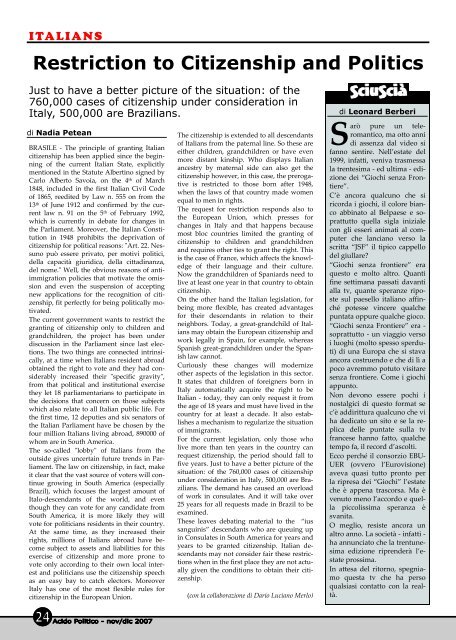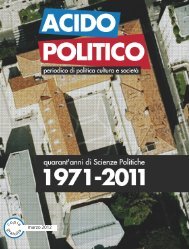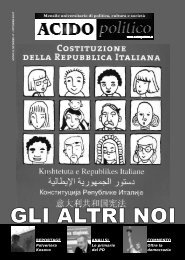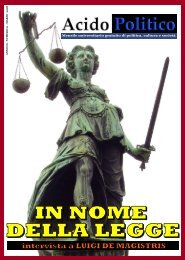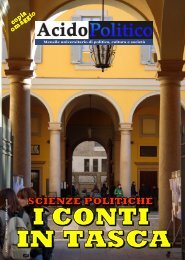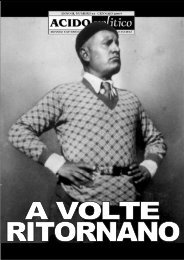Il lavoro nobilita l'uomo - Acido Politico
Il lavoro nobilita l'uomo - Acido Politico
Il lavoro nobilita l'uomo - Acido Politico
Create successful ePaper yourself
Turn your PDF publications into a flip-book with our unique Google optimized e-Paper software.
ITALIANS<br />
Restriction to Citizenship and Politics<br />
Just to have a better picture of the situation: of the<br />
760,000 cases of citizenship under consideration in<br />
Italy, 500,000 are Brazilians.<br />
di Nadia Petean<br />
BRASILE ‐ The principle of granting Italian<br />
citizenship has been applied since the begin‐<br />
ning of the current Italian State, explicitly<br />
mentioned in the Statute Albertino signed by<br />
Carlo Alberto Savoia, on the 4 th of March<br />
1848, included in the first Italian Civil Code<br />
of 1865, reedited by Law n. 555 on from the<br />
13 th of June 1912 and confirmed by the cur‐<br />
rent law n. 91 on the 5 th of February 1992,<br />
which is currently in debate for changes in<br />
the Parliament. Moreover, the Italian Consti‐<br />
tution in 1948 prohibits the deprivation of<br />
citizenship for political reasons: ʺArt. 22. Nes‐<br />
suno può essere privato, per motivi politici,<br />
della capacità giuridica, della cittadinanza,<br />
del nome.ʺ Well, the obvious reasons of anti‐<br />
immigration policies that motivate the omis‐<br />
sion and even the suspension of accepting<br />
new applications for the recognition of citi‐<br />
zenship, fit perfectly for being politically mo‐<br />
tivated.<br />
The current government wants to restrict the<br />
granting of citizenship only to children and<br />
grandchildren, the project has been under<br />
discussion in the Parliament since last elec‐<br />
tions. The two things are connected intrinsi‐<br />
cally, at a time when Italians resident abroad<br />
obtained the right to vote and they had con‐<br />
siderably increased their ʺspecific gravityʺ,<br />
from that political and institutional exercise<br />
they let 18 parliamentarians to participate in<br />
the decisions that concern on those subjects<br />
which also relate to all Italian public life. For<br />
the first time, 12 deputies and six senators of<br />
the Italian Parliament have be chosen by the<br />
four million Italians living abroad, 890000 of<br />
whom are in South America.<br />
The so‐called ʺlobbyʺ of Italians from the<br />
outside gives uncertain future trends in Par‐<br />
liament. The law on citizenship, in fact, make<br />
it clear that the vast source of voters will con‐<br />
tinue growing in South America (especially<br />
Brazil), which focuses the largest amount of<br />
Italo‐descendants of the world, and even<br />
though they can vote for any candidate from<br />
South America, it is more likely they will<br />
vote for politicians residents in their country.<br />
At the same time, as they increased their<br />
rights, millions of Italians abroad have be‐<br />
come subject to assets and liabilities for this<br />
exercise of citizenship and more prone to<br />
vote only according to their own local inter‐<br />
est and politicians use the citizenship speech<br />
as an easy bay to catch electors. Moreover<br />
Italy has one of the most flexible rules for<br />
citizenship in the European Union.<br />
The citizenship is extended to all descendants<br />
of Italians from the paternal line. So these are<br />
either children, grandchildren or have even<br />
more distant kinship. Who displays Italian<br />
ancestry by maternal side can also get the<br />
citizenship however, in this case, the preroga‐<br />
tive is restricted to those born after 1948,<br />
when the laws of that country made women<br />
equal to men in rights.<br />
The request for restriction responds also to<br />
the European Union, which presses for<br />
changes in Italy and that happens because<br />
most bloc countries limited the granting of<br />
citizenship to children and grandchildren<br />
and requires other ties to grant the right. This<br />
is the case of France, which affects the knowl‐<br />
edge of their language and their culture.<br />
Now the grandchildren of Spaniards need to<br />
live at least one year in that country to obtain<br />
citizenship.<br />
On the other hand the Italian legislation, for<br />
being more flexible, has created advantages<br />
for their descendants in relation to their<br />
neighbors. Today, a great‐grandchild of Ital‐<br />
ians may obtain the European citizenship and<br />
work legally in Spain, for example, whereas<br />
Spanish great‐grandchildren under the Span‐<br />
ish law cannot.<br />
Curiously these changes will modernize<br />
other aspects of the legislation in this sector.<br />
It states that children of foreigners born in<br />
Italy automatically acquire the right to be<br />
Italian ‐ today, they can only request it from<br />
the age of 18 years and must have lived in the<br />
country for at least a decade. It also estab‐<br />
lishes a mechanism to regularize the situation<br />
of immigrants.<br />
For the current legislation, only those who<br />
live more than ten years in the country can<br />
request citizenship, the period should fall to<br />
five years. Just to have a better picture of the<br />
situation: of the 760,000 cases of citizenship<br />
under consideration in Italy, 500,000 are Bra‐<br />
zilians. The demand has caused an overload<br />
of work in consulates. And it will take over<br />
25 years for all requests made in Brazil to be<br />
examined.<br />
These leaves debating material to the “ius<br />
sanguinis” descendants who are queuing up<br />
in Consulates in South America for years and<br />
years to be granted citizenship. Italian de‐<br />
scendants may not consider fair these restric‐<br />
tions when in the first place they are not actu‐<br />
ally given the conditions to obtain their citi‐<br />
zenship.<br />
(con la collaborazione di Dario Luciano Merlo)<br />
di Leonard Berberi<br />
S<br />
arò pure un tele‐<br />
romantico, ma otto anni<br />
di assenza dal video si<br />
fanno sentire. Nell’estate del<br />
1999, infatti, veniva trasmessa<br />
la trentesima ‐ ed ultima ‐ edi‐<br />
zione dei “Giochi senza Fron‐<br />
tiere”.<br />
C’è ancora qualcuno che si<br />
ricorda i giochi, il colore bian‐<br />
co abbinato al Belpaese e so‐<br />
prattutto quella sigla iniziale<br />
con gli esseri animati al com‐<br />
puter che lanciano verso la<br />
scritta “JSF” il tipico cappello<br />
del giullare?<br />
“Giochi senza frontiere” era<br />
questo e molto altro. Quanti<br />
fine settimana passati davanti<br />
alla tv, quante speranze ripo‐<br />
ste sul paesello italiano affin‐<br />
ché potesse vincere qualche<br />
puntata oppure qualche gioco.<br />
“Giochi senza Frontiere” era ‐<br />
soprattutto ‐ un viaggio verso<br />
i luoghi (molto spesso sperdu‐<br />
ti) di una Europa che si stava<br />
ancora costruendo e che di lì a<br />
poco avremmo potuto visitare<br />
senza frontiere. Come i giochi<br />
appunto.<br />
Non devono essere pochi i<br />
nostalgici di questo format se<br />
c’è addirittura qualcuno che vi<br />
ha dedicato un sito e se la re‐<br />
plica delle puntate sulla tv<br />
francese hanno fatto, qualche<br />
tempo fa, il record d’ascolti.<br />
Ecco perché il consorzio EBU‐<br />
UER (ovvero l’Eurovisione)<br />
aveva quasi tutto pronto per<br />
la ripresa dei “Giochi” l’estate<br />
che è appena trascorsa. Ma è<br />
venuto meno l’accordo e quel‐<br />
la piccolissima speranza è<br />
svanita.<br />
O meglio, resiste ancora un<br />
altro anno. La società ‐ infatti ‐<br />
ha annunciato che la trentune‐<br />
sima edizione riprenderà l’e‐<br />
state prossima.<br />
In attesa del ritorno, spegnia‐<br />
mo questa tv che ha perso<br />
qualsiasi contatto con la real‐<br />
tà.


